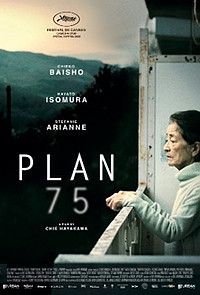| SHADOWS ON THE WALL | REVIEWS | NEWS | FESTIVAL | AWARDS | Q&A | ABOUT | TALKBACK | |||||||||||||
 Shadows off the beaten path Shadows off the beaten pathIndies, foreign, docs and shorts...
On this page:
HARKA |
HILL OF VISION |
PLAN 75
| |||||||||||||
| See also: SHADOWS FILM FESTIVAL | Last update 7.May.23 | |||||||||||||
|
Harka Review by Rich Cline | 
| |||||||||||||
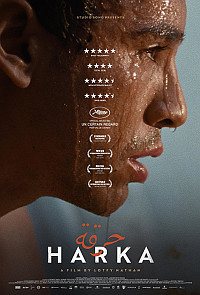 dir-scr Lotfy Nathan prd Alex Hughes, Riccardo Maddalosso, Eugene Kotlyarenko, Maurice Fadida, Julie Viez with Adam Bessa, Najib Allagui, Salima Maatoug, Ikbal Harbi, Khaled Brahem, Hsouna Heni, Jamal Madani, Mohamed Ouni, Elyes Riahi, Mohamed Nsibi, Khaled Barsaoui, Moez Hannachi release Tun 11.Jan.23, UK 5.May.23 22/Tunisia 1h27 CANNES FILM FEST Is it streaming? |
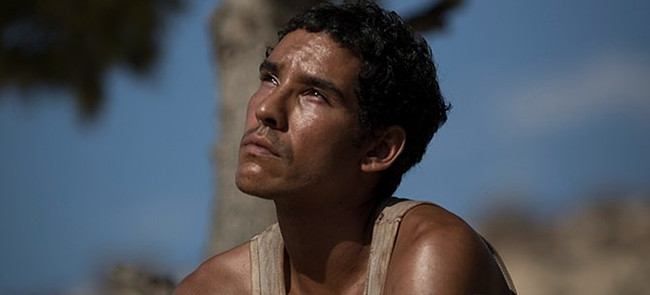 From Tunisia, this earthy drama is grounded in real-world events of the Arab Spring, observed with striking attention to detail by American filmmaker Lotfy Nathan. It's an unusually visceral coming-of-age story about a young man trying to make sense of his society and his future. Along with beautiful wide-screen cinematography by Maximilian Pittner, the film features a riveting performance from Adam Bessa that's unnervingly easy to identify with. In his 20s, Ali (Bessa) is struggling to make a living selling contraband petrol, while listening to his friends brag about all the money and women available in Germany. So he is secretly saving money to embark to Europe by boat. Then his father dies, and Ali has to return home to care for his teenaged sisters, cleaner Sarra (Harbi) and schoolgirl Alyssa (Maatoug), while his brother Skander (Brahem) takes a new job on the coast. But their father's debt threatens their home, and Ali struggles to see a way out of an impossible situation. Like the protagonist of a Ken Loach film, Ali becomes increasingly frustrated by rampant criminality that's woven through every aspect of his society, endangering his family and obliterating his dreams. This is exacerbated when, on a visit to ask Skander for help, he sees the disdain of pampered coastal tourists for hard-working locals. Intriguingly, the film is narrated by younger sister Alyssa, offering a counterpoint perspective. She sees Ali as an almost mythical figure, but isn't oblivious to the reality. Bristling with conflicting emotions, Bessa is mesmerising as a young man trying to make his way through a range of staggering obstacles. Because he has been robbed by the bank and police, his escalating rage is compelling and honest. So it's harrowing to watch him boil over as he faces one setback after another. Thankfully, the performance is nuanced to allow for glimmers of hope, especially in Bessa's textured scenes with Harbi and Maatoug. While Brahem adds nuance as a man whose own issues are felt without being seen. The title refers both to burning and to escaping by boat, and Ali begins to see his only options as either staging a self-immolation protest or seeking asylum across the Mediterranean. Both of these are acts of extreme desperation, and as writer and director Nathan refuses to flinch in the face of such a bleak situation. So the film's extended climactic shot is powerfully devastating, forcing the audience to consider the rampant injustices we should not accept as everyday truths.
| ||||||||||||
|
Hill of Vision Review by Rich Cline | 
| |||||||||||||
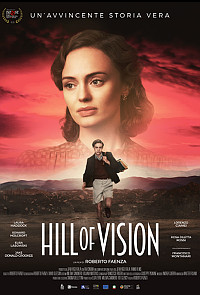 dir Roberto Faenza scr David Gleeson, Roberto Faenza prd Milena Canonero, Elda Ferri, Rex Glensy with Laura Haddock, Jake Donald-Crookes, Edward Holcroft, Elisa Lasowski, Lorenzo Ciamei, Sofia D'Elia, Ruben Buccella, Francesco Montanari, Rosa Diletta Rossi, Neil McGarry, Rufus Gleave, Elisabeth Kanettis release It 16.Jun.22 21/Italy Rai 1h41 Is it streaming? |
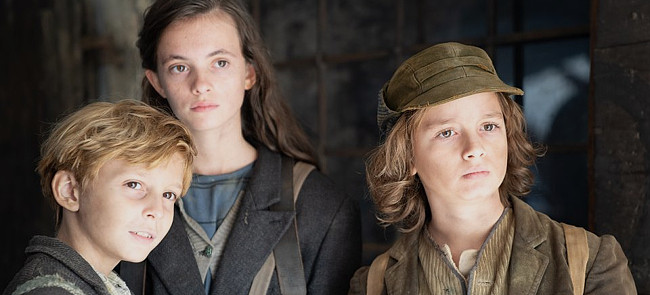 Following its youthful central figure from Italy to America, this complex true story is told in a compelling, involving style by an eclectic cast and crew. The series of events are properly momentous, largely recreated through the gauzy sentimentality of memory, but the film still generates a powerful kick thanks to vivid characters and situations. Director Roberto Faenza also maintains an edge of realism alongside a warm-hearted approach. In wartime 1943 Italy, US-born Lucy (Haddock) is imprisoned by Nazis, and her young son Mario (Ciamei) runs away. Surviving on the streets, he teams up with teen girl Frank (D'Elia) and mute Brother (Buccella) to track down his Italian father (Montanari). But they are captured and placed in an orphanage. After the war Lucy finds Mario (now Donald-Crookes) and they head to America, where they join Lucy's brother Edward (Holcroft) and his wife Sarah (Lasowski) in the Quaker community Hill of Vision. Of course, Mario has no idea how to be a normal schoolboy. It's in the final half that deeper themes emerge, exploring how Mario and Lucy struggle with harrowing past events they miraculously survived. Mario is further triggered by a particularly nasty classroom bully (Gleave), whom the principal (McGarry) seems unwilling to question. With the help of his aunt and uncle, Mario finds self-discipline and an interest in science, both of which significantly mark his later life. And while lovely light humour adds superb textures, it's the darker, layered drama between Mario and Lucy that keeps the film gripping. The film's generally serious tone makes Haddock's role especially tricky, but she avoids letting Lucy become too dour by maintaining a spark behind the eyes. This glint of mischief is also played sharply by both Ciamei and Donald-Crookes as the strong-willed, resourceful Mario. And Holcroft and Lasowski are terrific as pivotal figures in this boy's life, offering a knowing sense of understanding, even as they acknowledge that they can never fully grasp what Mario and Lucy have been through. Because this is based on real events, there are plot elements that feel somewhat unfinished, such as Mario's relationship with his militaristic father or the mysterious writings Lucy keeps in a box. But these kinds of things remind us that true stories are generally much messier than fiction. And even as this film becomes a bit worthy, the narrative is packed with fascinating historical details, provocative twists and moving personal touches that bring Mario Capecchi's story to life in a beautiful way.
| ||||||||||||
|
Plan 75 Review by Rich Cline | 
CANNES FILM FEST TORONTO FILM FEST Is it streaming?
| 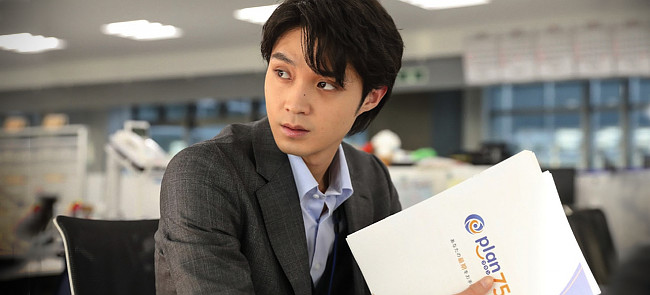 Beautifully shot and edited, this Japanese drama tells three interconnected stories set in an alternate near future. With a premise revolving around assisted suicide, this isn't easy to watch. Thankfully, writer-director Chie Hayakawa stirs some warm humour and dark irony into the film's achingly sad tone. It's the kind of movie that will appeal to arthouse cinema fans, and perhaps those who think rather a lot about death. With an ageing population, Japan's government encourages citizens over 75 to enter a programme that leads to their humane death, which for the wealthy is downright luxurious. Working for Plan 75, young Hiromu (Isomura) helps seniors sign up for the process, but is unsure what to do when his uncle (Takao) turns 75. Approaching retirement, 78-year-old retiree Michi (Baisho) doesn't have a family to care for her, and struggles to find work. And cleaner Maria (Arianne) takes a job with Plan 75 to fund an operation for her young daughter back home in the Philippines. With scenes that move at a glacial pace, the film requires patience. But remarkable details are peppered throughout the story, including real-life touches that ground the fiction in present-day fact. Characters are remarkably authentic in the way they react to what happens around them. So even if the storytelling is eerily aloof, with all three plot threads ending on ambiguous notes, there are many points at which the audience can identify with these people. Performances are understated but brimming with emotionality. At the centre, Baisho has terrific presence as an older woman who has plenty of life left and wants to continue to feel useful. Her interaction with others carries ripples of intelligence and yearning. With his unusually youthful physicality, Isomura adds another layer of authenticity, a 20-something guy who only begins to understand the nature of his work as he reestablishes ties with his uncle. And Arianne has the most engaging role as a woman who feels powerless to save her daughter. Because each of these storylines circles around death and dying, it seems odd that filmmaker Hayakawa injects so little hope into the narrative. In keeping with the underlying sense of irony, she includes a number of scenes that use hopeful cinematic imagery, but they're far bleaker than they seem. Indeed, even in the film's complex series of final shots, the three central characters are left dangling precariously on the edge of despair. This is a challenging movie, but it provokes us to face our mortality.
| 
See also: SHADOWS FILM FESTIVAL © 2023 by Rich Cline, Shadows
on the Wall
HOME | REVIEWS | NEWS | FESTIVAL | AWARDS
| Q&A | ABOUT | TALKBACK | | ||||||||||


